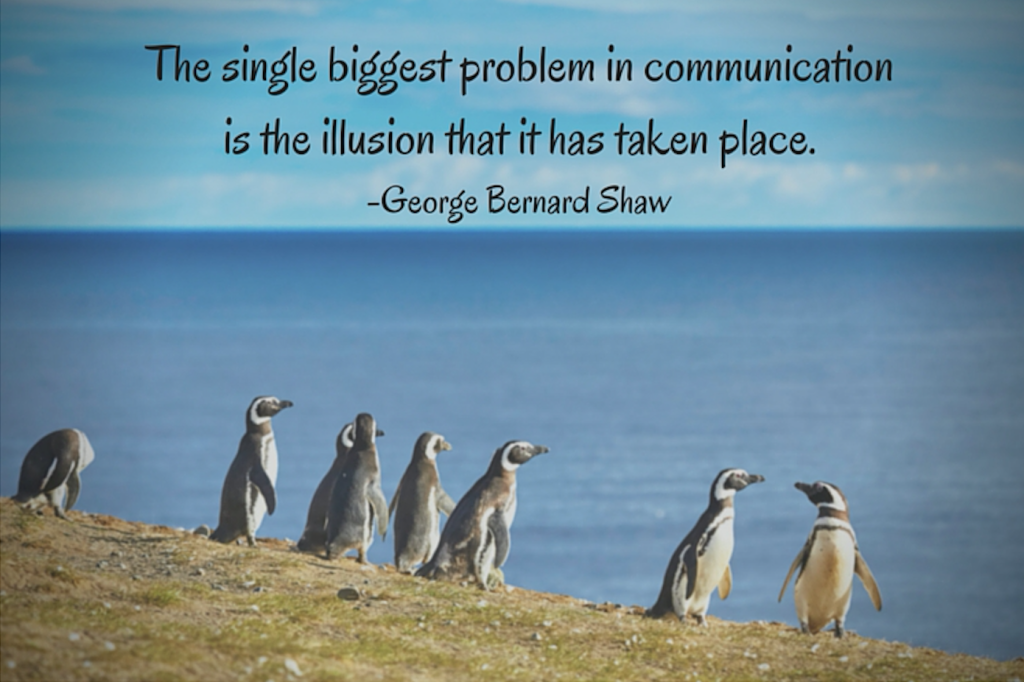#2 Effective Communication
This 5-part series is to explore the different ways an HR consultant can add value to your organization’s bottom line. Last week’s blog looked at how strategic hiring can positively impact your profitability. In it, we covered the 5 hiring pitfalls that can be expensive and employee draining.
This week we are examining how effective communication can lead to better business results.

————————————————————————————————————————-
Let’s look at some stats
–HR Magazine reports that in a survey of 4,000 employees, 46% said they routinely received confusing or unclear directions, with 36% of these employees reporting it happening up to three times each day. Participants in the study estimated they wasted about 40 minutes of productivity each day trying to interpret unclear or confusing directions.
-Businesses with effective communication practices were more than 50% more likely to report employee turnover levels below the industry average (Source: Watson Wyatt)
Why Should I care about my communication skills?
‘Don’t communicate to be understood; rather, communicate so as not to be misunderstood’ – Dr. John Lund
One trend I’ve seen in talking with employees over the years is… everything boils down to effective communication. It seems so simple doesn’t it! So many business owners have their business owner/decision maker hats on and I believe (many times) they sincerely forget to think about a situation from their employee’s perspective. Stepping back from the hustle and bustles of deadlines and customer issues, and to either ask your employees how they would handle a situation or to give them the courtesy of informing them of your decision and the reasons behind it is significant. It can make all the difference between an appreciative employee and an employee that degrades your leadership style and decisions causing discourse in your organization. Over time the habit of not communicating effectively can be detrimental to your workforce leading to customer issues and serious employee productivity and retention issues.
Communication is an essential leadership skill that builds vision, camaraderie, ethical standards, and a culture of trust and appreciation. It seems a little overwhelming when you think of all the areas a communication strategy can either advance or decelerate an organization. The good news is that no organization or business owner is perfect and it all starts with recognizing the need for effective communication and taking steps to improve it little by little.
How Can I improve?
As an HR Consultant, I feel like I am very in tune to the typical communication issues that can crop up in an organization. I’ve had the privilege of working at a premier self-directed teaming site where leadership and communication was central to the site’s effectiveness and operating rhythm. This experience has been instrumental in how we create effective communication strategies for small businesses. However, you don’t necessarily need an HR consultant to teach you how to communicate. Many managers and business owners have these skills. It is just learning how to exercise them in an effective and value-added manner. For instance, an employee newsletter that nobody reads would be considered ineffective. On the other hand, an all employee meeting that employees willingly attend and actually participate in would be considered effective.
There are solutions that range in robustness.
1) First, just being aware of employee thoughts, concerns and/or innovative ideas and being committed to asking for opinions is the first step in the right direction.
2) If you want to take it a little deeper, you could evaluate your current communication rhythm (if you have one) and try to set up goals for how and when to communicate.
3) Lastly, you could get an HR assessment on how your employees currently feel about the organization’s communication style, and then set a plan in place (with employee input) to fill the gap.
As you can see there are varying levels of addressing communication gaps in the workforce but again it’s the realization of the need first and foremost. If you are interested in Human Resources advice on your communication strategy, we are here and happy to help! Contact us for a Free Consultation.
Next week HR Designs will discuss why an HR policy is still necessary in today’s workforce and how it can benefit your organization’s bottom line.
–Your local Chattanooga HR Consultant


Comments are closed.